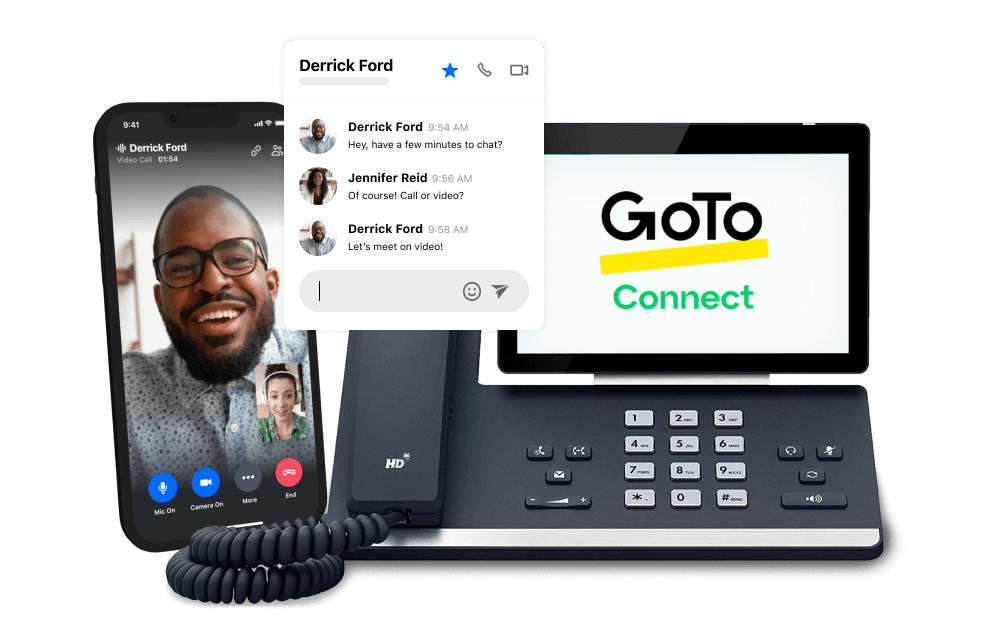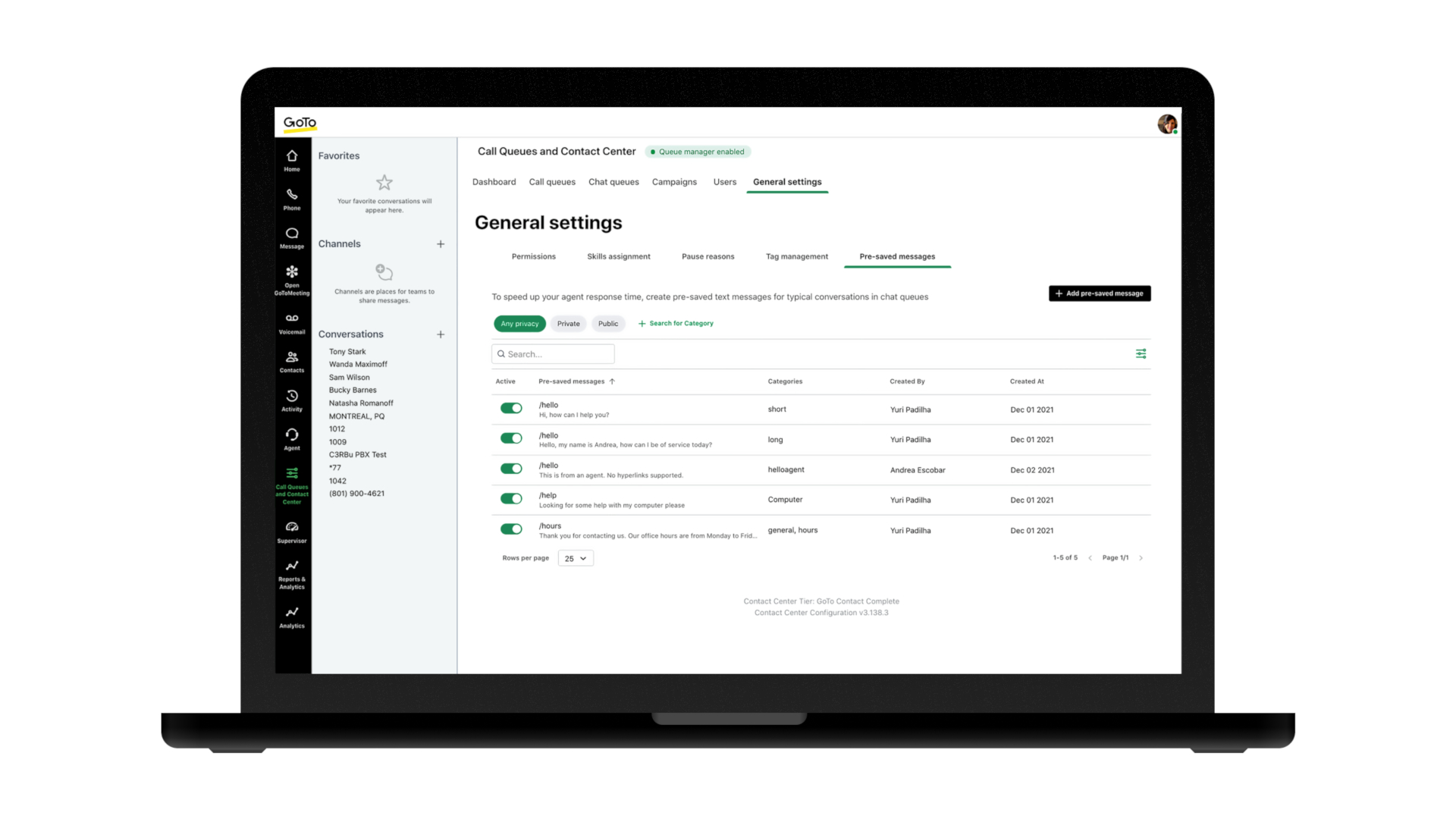Why desk phones are the missing ingredient for the work-from-anywhere business
Smartphones are all very well, but the old-fashioned phone call still has a role to play

With so much reliance on modern devices like smartphones and tablets, and the cloud-based communication services that power them, it’s easy to overlook the humble desk phone when it comes to speccing out a remote working strategy. For many small businesses, however, desk phones (and the telephony infrastructure that underpins them) are an essential part of their workflows.
This GoTo-sponsored article will explore why the functionality of desk phones is still needed in a modern organisation, and how a comms strategy which enables video conferencing, digital collaboration and traditional phone calls on an equal footing can unlock greater flexibility and more powerful hybrid working.
To say that the world of modern business has changed dramatically over the years would be something of an understatement; transplant an average worker from 1974 into a modern office, and they’d probably go into shock-induced catatonia. Our working lives have gradually been transformed, modernised and revolutionised, and almost all of these changes have been the result of a growing evolution in technology.
A series of innovations - first email, then the internet, followed by smartphones, video conferencing and the cloud - have made us more connected, more productive and more versatile. Even over the past two years, a pandemic-induced wave of remote working has driven tectonic shifts in our attitudes to business collaboration. Back in 2019, the idea of hybrid work being a widely accepted standard would have been all but unthinkable, but modern technology allowed us to make the jump without sacrificing our ability to connect with our colleagues.

Don’t overlook the humble phone call
Despite the phenomenal leaps in technology that successive decades have delivered, there’s one element of professional communication that has remained a steadfast constant: the humble phone call. For more than a century, the telephone has been one of the most reliable methods for conducting business, maintaining relationships and reaching out to new clients and partners, and it doesn’t show any signs of fading from relevance.
There’s a good reason for this, too; a study by the University of Texas in 2020 found that talking on the phone made people feel far more comfortable and connected, and resulted in the formation of stronger bonds, than exchanging emails or chatting via text. Simply put, human beings are hard-wired to respond positively to the sound of each other’s voices in ways that other forms of communication simply can’t replicate.
In a business environment that relies on forming and reinforcing strong connections with customers, suppliers and partners, this makes phone calls a vital tool in any organisation’s arsenal. This is particularly true for small businesses, where outbound sales may form a significant part of their go-to-market strategy.
Why desk phones should be part of your hybrid work strategy
Interestingly, despite the importance of phone calls as a business enabler, telephony is often overlooked by organisations when planning their hybrid working strategy. While digital collaboration and video conferencing platforms are (rightly) highlighted as central components for supporting transformation projects, landlines and desk phones are often the first things to go when implementing flexible working, hot-desking or any other modern agility initiatives.
The logic behind this is reasonably straightforward - we all have a mobile phone which we constantly carry around with us, usually with a reasonably generous calling plan, so any phone calls that need to be made can be done using those. Some organisations will even pay for a company-provided device with its own dedicated contract and phone number. At first glance, this would appear to be enough, but businesses which don’t advance their telephony strategy beyond this risk missing out on a multitude of opportunities and advantages which a properly-integrated digital phone solution can offer.
For example, if a partner or prospective customer calls one of your salespeople on their personal mobile, but that salesperson is currently unavailable, then they’ll miss the call - at which point, the caller will either leave a voicemail message, or (more likely) will simply hang up and go on with their day. That employee will then need to call them back (hoping to catch them at a good time) before the transaction can proceed - and this process of telephone tag can go on for days, if not weeks.
A modern digital telephony platform like GoTo Connect, however, includes the ability to create detailed and customised call handling rules. This allows businesses to design their system so that if the target recipient of a phone call doesn’t pick up, it’s automatically transferred to another person, such as a colleague on the same team. You can also set up ring groups so that when someone calls an extension, multiple phones ring simultaneously, maximising the chances that someone will be able to answer in a timely manner.

A seamless experience across devices
For small businesses, digital phone systems offer a range of tools which can help them replicate the customer experience one would expect from a much larger organisation. Digital receptionists can be used to route callers through to the appropriate department in a friendly and engaging way, while call queues ensure that a limited number of employees doesn’t result in missed calls and missed opportunities. If you inject some of your business’s personality into the process, you can even set custom hold music.
Crucially, this also doesn’t rely on remaining shackled to desk phones. Thanks to the flexibility of the cloud, platforms like GoTo Connect can offer a seamless experience across digital desk phones, mobile devices and desktop PCs, allowing staff to make and manage calls with the same level of flexibility and functionality whether they’re at home or in the office. In fact, you can even switch from one to the other in the middle of an active call.

In addition to this, GoTo’s all-in-one administrator portal allows businesses to oversee every aspect of their unified comms estate through a single-pane-of-glass cloud management dashboard. This makes troubleshooting and remediating issues significantly easier, and eliminates the headache of having to switch between multiple portals to manage individual on-premise comms systems.
These capabilities put the power and versatility of enterprise-grade communication within reach of small businesses without requiring expensive investments in PBX infrastructure or SIP trunking. They’re especially transformational when rolled out as part of a unified strategy which places digital collaboration, video conferencing and cloud-based telephony on an equal footing.
Phone calls are, and will remain, an essential vector for business communications, and investing in a properly architected digital phone platform can supercharge both your inbound and outbound relationships, allowing your staff to better connect with your customers and partners. The future is calling - don’t let it go to voicemail.
- We've also highlighted the best VoIP services and the best VoIP phones
Get daily insight, inspiration and deals in your inbox
Sign up for breaking news, reviews, opinion, top tech deals, and more.
